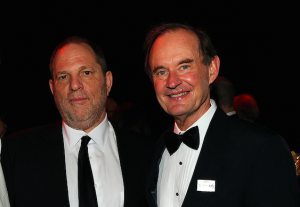
(Photo by Larry Busacca/Getty Images for TIME)
There are lots of reasons why Harvey Weinstein was able to allegedly sexually harass and abuse so many women for so long. His money and power provided a natural defense to women speaking out against him, but more and more details are emerging that he also used those tools to go on the offensive against women who might dare to tell their stories. He used Biglaw firms and non-disclosure agreements to silence some. And now comes a story from Ronan Farrow writing for the New Yorker, about Weinstein’s network of “spies” — Kroll, a corporate-intelligence company, and Black Cube, an investigative company run by former Israeli intelligence agents — and respected litigator David Boies’s role in keeping the allegations against the Hollywood mogul under wraps.
Black Cube’s engagement was explicitly intended to prevent the publication of abuse allegations — the ones that eventually exploded with a New York Times piece. They were charged with creating profiles on each of their “targets,” often using false pretenses to gain access. Black Cube’s work included psychological profiles and sexual histories of potential Weinstein accusers, and that engagement was run through Boies Schiller Flexner, likely to bring the investigation under the patina of attorney-client privilege.

Why Your Practice Is Burning Money And How You Can Do Better
Our expert panel explores common sources of profit leakage along with practical steps for improvement.
Boies personally signed the contract with Black Cube. The New Yorker reports the engagement was to “provide intelligence which will help the Client’s efforts to completely stop the publication of a new negative article in a leading NY newspaper” and to “obtain additional content of a book which (sic) currently being written and includes harmful negative information on and about the Client.” The “leading NY newspaper” was the New York Times, which was investigating the allegations against Weinstein at the time of the Black Cube engagement. That’s the same New York Times that Boies was simultaneously representing the Times in other matters, including a libel case.
Boies denies the engagement of Black Cube was a conflict with the representation of the Times. He told Farrow he never tried to pressure reporters, and that any effort to do so would be inappropriate:
From the beginning, he said, he advised Weinstein “that the story could not be stopped by threats or influence and that the only way the story could be stopped was by convincing the Times that there was no rape.” Boies told me he never pressured any news outlet. “If evidence could be uncovered to convince the Times the charges should not be published, I did not believe, and do not believe, that that would be averse to the Times’ interest.”
….
“Given what was known at the time, I thought it was entirely appropriate to investigate precisely what he was accused of doing, and to investigate whether there were facts that would rebut those accusations,” he said.
According to Farrow, Black Cube’s list of “targets” that they were gathering information on included journalists.
As one may imagine, the New York Times takes a very different view of Boies’s work for Weinstein.
NYT statement on David Boies’s involvement in the effort to undermine its reporting on Harvey Weinstein https://t.co/IyqwYgihhi pic.twitter.com/z684NI86kB
— The New York Times (@nytimes) November 7, 2017
But Boies hasn’t washed his hands of all responsibility. He admits his firm did not direct the investigation, and that it was an error in judgment:
Boies said that his firm’s involvement with the investigators was a mistake. “We should not have been contracting with and paying investigators that we did not select and direct,” he told me. “At the time, it seemed a reasonable accommodation for a client, but it was not thought through, and that was my mistake. It was a mistake at the time.”
He goes on to to acknowledge his role in perpetuating the cone of silence that allowed Weinstein to operate unencumbered for so long:
Of his representation of Weinstein in general, he said, “I don’t believe former lawyers should criticize former clients.” But he expressed regrets. “Although he vigorously denies using physical force, Mr. Weinstein has himself recognized that his contact with women was indefensible and incredibly hurtful,” Boies told me. “In retrospect, I knew enough in 2015 that I believe I should have been on notice of a problem, and done something about it. I don’t know what, if anything, happened after 2015, but to the extent it did, I think I have some responsibility. I also think that if people had taken action earlier it would have been better for Mr. Weinstein.”
Even smart people with strong liberal bona fides can enable sexual harassment and assault. Boies’s admissions are a small, but vital, step to begin the process of fixing the problem. Hopefully, as awareness of the issue grows (#metoo), future lawyers who find themselves in the position of covering for a sexual predator remember the (bad) example of David Boies and take action to stop them.
Harvey Weinstein’s Army of Spies [New Yorker]
 Kathryn Rubino is an editor at Above the Law. AtL tipsters are the best, so please connect with her. Feel free to email her with any tips, questions, or comments and follow her on Twitter (@Kathryn1).
Kathryn Rubino is an editor at Above the Law. AtL tipsters are the best, so please connect with her. Feel free to email her with any tips, questions, or comments and follow her on Twitter (@Kathryn1).
